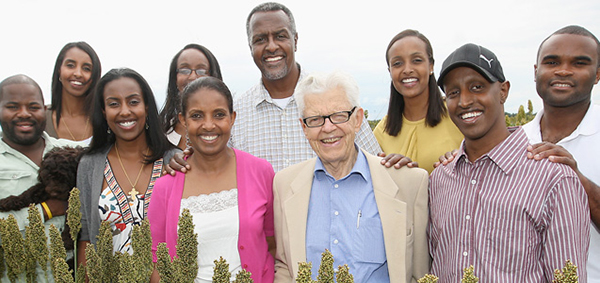NEWSLETTER
|
Lowell Hardin: “Quietly Inspirational” By Sheila Avrin McLean
Lowell and Ralph Cummings, Lowell’s counterpart at Rockefeller, were concocting an idea to follow up on the work being done by several new and promising agricultural research centers in The Philippines (the International Rice Research Institute, or IRRI) and Mexico (the International Maize and Wheat Improvement Center, or CIMMYT) by creating a coalition of donors run out of the World Bank called the Consultative Group for International Agricultural Research, or CGIAR.
The World Bank meeting was supportive of the notion but concluded by tying the future of the concept to a condition that the Indian Government would—quickly, with a deadline of at most, as I recall, three months—recognize as an “international organization” a-yet-to-be created legal entity then in Hyderabad: ICRISAT, a research institution devoted to agriculture in the semi-arid tropics.
Other than Lowell and Ralph, the other experienced internationalists around the table thought this an impossible challenge. Essentially, the question was how to get a famously laborious and slow government bureaucracy to agree on a then-novel approach to a complicated legal structure. Lowell and Ralph assured the group “this can be done”, and I had the privilege, as a then very young and inexperienced lawyer, to assure, with another then-FF lawyer, Phillip Hahn, the legal niceties.
But it was Lowell and Ralph who teamed to do the “heavy lifting” of convincing the Indian complex of ministries to recognize an unusual legal entity inside India as having the characteristics of an international entity, tied to UN institutions, the World Bank and U.S. foundations.
And so began my work with Lowell, which was quietly inspirational and often very successful in finding solutions to hunger problems internationally. While the agreements, constitutions and by-laws drafted for the emerging CGIAR centers and the system as a whole were my sphere, they would have been for naught but for the knowledge, grace and insights Lowell (and Ralph and other agricultural experts) shared in politically savvy ways with government ministries and bureaucrats as diverse and far-flung as in India, Syria, Nigeria and other countries, enabling what nay-sayers said couldn’t be enabled.
When I think of Lowell, I think of a gracious, informed man who knew how to put knowledge to work. I am sorry he is no longer with us.
|


